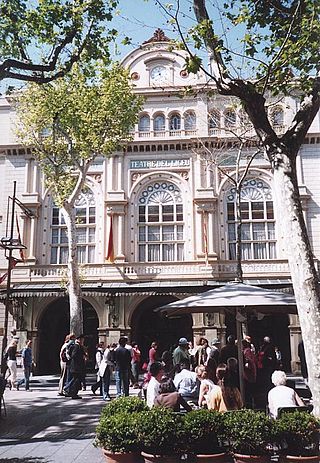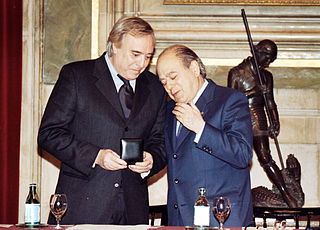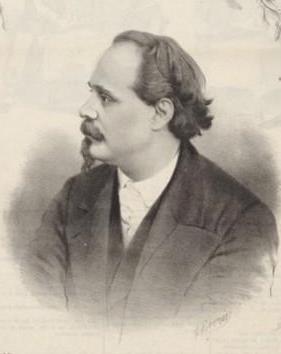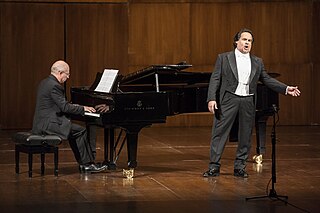

Virginia Damerini was an Italian opera singer, active in the 1880s and 1890s.


Virginia Damerini was an Italian opera singer, active in the 1880s and 1890s.
Virginia Damerini was born and raised in the Apennines region of Italy. [1]
Damerini was a dramatic soprano. In 1884 she toured several American cities from Brooklyn to San Francisco with the Milan Grand Opera Company. [2] [3] During that tour, The New York Times commented that "Signora Damerini's style is both refined and expressive." [4]
She performed in the premiere of Alberto Franchetti's Asrael in 1888. She sang the title role in Fosca in 1889 at Modena and again in 1890, at La Scala in Milan, with conductor Arnaldo Conti. [5] She sang the "notoriously difficult" title role in Vincenzo Bellini's Norma with Arturo Toscanini conducting, at Palermo in 1893. [6] In 1893, she was singing at El Gran Teatre del Liceu in Barcelona on the night when the theatre was bombed by anarchist Santiago Salvador Franch . [7] Her sister Marie Damerini was reported among the casualties in the explosion. [8]

The Gran Teatre del Liceu, known as El Liceu, is an opera house in Barcelona, Catalonia, Spain. Located in La Rambla, it is the oldest running theatre in Barcelona.

Conservatori Superior de Música del Liceu is a music college in Barcelona, Catalonia, Spain. It was created in 1837 with the name Liceo Filo-dramático de Montesión.
Brian Asawa was a Japanese American opera singer who sang as a countertenor. About Asawa, Opera News stated: "In his prime, Asawa was an electric performer, his fearless performing style supported by a voice of arresting beauty and expressivity."

Jaume Aragall i Garriga, better known as Giacomo Aragall, is a Spanish operatic tenor. He became known for his role singing Rodolfo in Puccini's La bohème in the late 1960s, and it would become one of the most frequently performed of his career. In 1994 he founded the Giacomo Aragall International Singing Competition.

L'arbore di Diana, is an opera in two acts composed by Vicente Martín y Soler, with an original libretto by Lorenzo da Ponte. It premiered at the Burgtheater in Vienna on 1 October 1787.

Viorica Cortez is a noted Romanian-born mezzo-soprano, later French by naturalisation. Starting her operatic and concert career in the mid-1960s, she went on to become one of the most prominent female performers of the '70s and '80s. An example of professional longevity, she is present on some of the most prestigious European opera scenes.

Ildikó Komlósi is a Hungarian mezzo-soprano.

Alessandro Polonini was an Italian bass-baritone. He created the roles of Benoît and Alcindoro in Puccini's opera La bohème, as well as Geronte de Ravoir in his Manon Lescaut. Polonini also created the role of the surgeon in Verdi's La forza del destino.
Carlos Cosías is a Spanish operatic tenor born in Barcelona, Spain.

Giuseppina Pasqua was an Italian opera singer who performed throughout Italy and Europe from the late 1860s through the early 1900s. She began her career as a soprano when she was only 13, but later retrained her voice as a mezzo-soprano. She sang in several world premieres, but is most remembered today for having created the role of Mistress Quickly in Giuseppe Verdi's Falstaff. The composer wrote the role specifically for her and dedicated the act 2 aria "Giunta all' albergo" to Pasqua. She was married to the baritone Astorre Giacomelli.
Marina Domashenko is a Russian operatic mezzo-soprano.
Francesc Viñas i Dordal was a Spanish operatic tenor. He is also known by the Spanish version of his name, Francisco Viñas and the Italian version, Francesco Vignas. He was particularly known for his performances in the operas of Richard Wagner and sang in the first production of Parsifal outside Bayreuth.

Mario Tiberini was an Italian tenor who sang leading roles in the opera houses of Europe and the Americas in a career spanning 25 years. Known for his advanced singing technique and dramatic ability, he sang the role of Alvaro in the premiere of the revised version of Verdi's La forza del destino and created several roles in operas by lesser-known composers, including the title role in Faccio's Amleto.

Angiolina Ortolani-Tiberini was an Italian soprano who sang many leading roles in European opera houses during a career spanning over twenty years. After their marriage in 1858, her career was closely entwined with that of her husband, the tenor Mario Tiberini, with the couple often appearing together on stage. Amongst the roles she created was Ofelia in Franco Faccio's Amleto.
Amarilli Nizza is an Italian operatic soprano.
Daniela Barcellona is an Italian operatic mezzo-soprano.

Josep Bros i Jiménez and primarily performing under the name José Bros, is a Catalan operatic tenor particularly known for his performances in the bel canto repertoire both on stage and in full-length opera recordings.

Concepció Bordalba i Simón was a Catalan operatic soprano who performed under the name Concetta Bordalba outside her native Spain. She spent most of her career in Italy or with touring Italian opera companies and was particularly known for her performances as Elsa in Wagner's Lohengrin and Margherita in Boito's Mefistofele.
Christina Scheppelmann is a German arts administrator. Scheppelmann is the general director of the Seattle Opera. She is one of the major female opera administrations in the United States, along with Francesca Zambello of the Washington National Opera, Khori Dastoor of Houston Grand Opera, Deborah Sandler of Lyric Opera of Kansas City, Annie Burridge of Austin Opera, and Sue Dixon of Portland Opera.

Andrea Avelina Carrera was a Spanish operatic soprano who frequently performed at the Gran Teatro del Liceo in Barcelona. It was there she made her debut in 1889 as Elsa in Richard Wagner's Lohengrin as a substitute, receiving enthusiastic reviews. In the 1890s, she toured Spain but also appeared in Italy and Portugal, while in the early 1900s she performed in Latin America. In March 1896, at Milan's La Scala she appeared in the world premiere of Umberto Giordano's Andrea Chénier, creating the role of Maddalena. On retiring in 1910, she trained students in Barcelona.